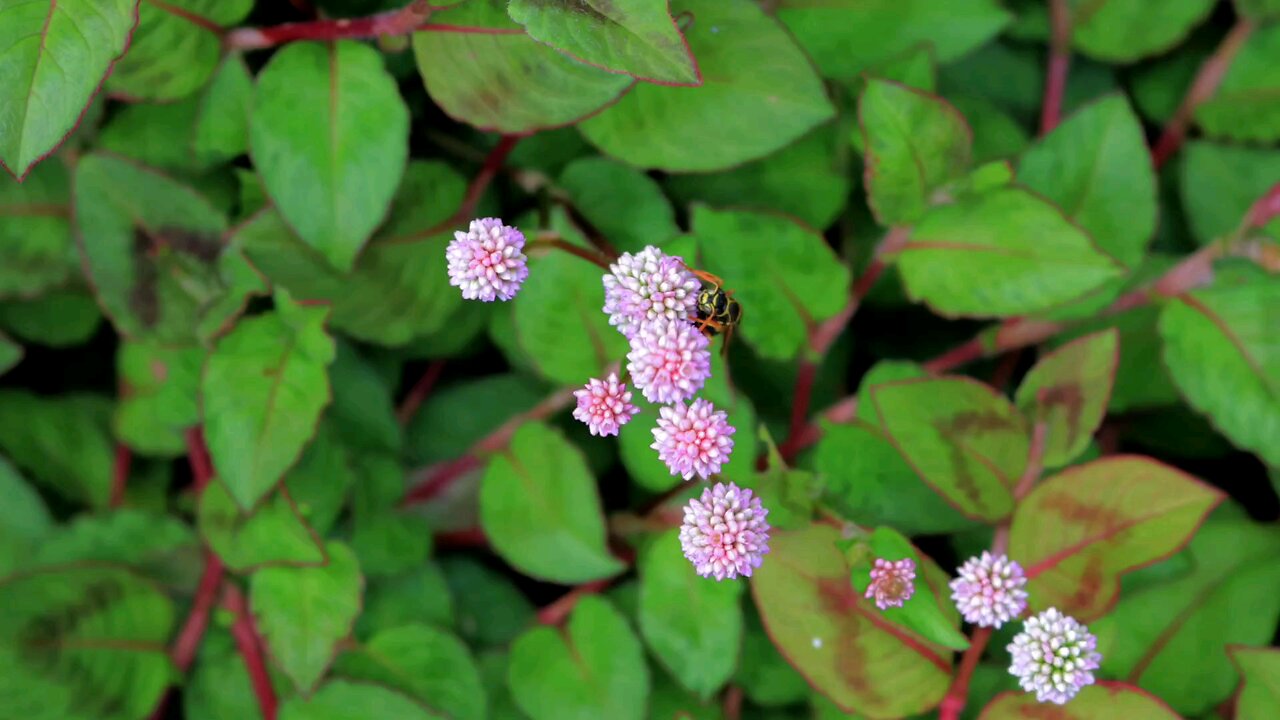Premium Only Content

"Persicaria capitata: The Pink Knotweed's Hidden Beauty"
Persicaria capitata, commonly known as Pink Knotweed or Pinkhead Smartweed, is a creeping perennial plant in the family Polygonaceae. It is native to parts of Asia but has spread to various regions as an ornamental plant. Its distinctive appearance makes it a popular ground cover.
Here are some details about Persicaria capitata:
1. Appearance
Flowers: The plant produces small, round clusters of pink or reddish-pink flowers, giving it the nickname "Pinkhead." Each flower is tiny but grouped together in globular inflorescences, creating a striking look.
Leaves: The leaves are oval to lance-shaped, with a dark green to reddish-green hue, often marked with a dark V-shaped band. They have a somewhat hairy texture.
Growth Habit: It grows low to the ground, forming dense mats. It spreads by rooting at the nodes, making it effective as a ground cover.
2. Habitat
Persicaria capitata prefers sunny or partially shaded areas with well-draining soil. It thrives in gardens, lawns, and even disturbed sites.
It is drought-tolerant once established, though it prefers moist environments.
3. Uses
Ornamental: This plant is primarily grown as an ornamental for its attractive foliage and flowers. It is often used in rock gardens, as ground cover, or in hanging baskets.
Erosion Control: Due to its creeping nature, it is sometimes used to prevent soil erosion on slopes or in areas prone to soil disturbance.
4. Invasiveness
In some regions, Persicaria capitata is considered invasive due to its aggressive growth habit, particularly in climates that support year-round growth. It can spread rapidly and outcompete native plants.
5. Cultural Significance
In traditional medicine, some species of Persicaria have been used for their potential medicinal properties, although P. capitata itself is not as commonly used for this purpose.
Overall, Persicaria capitata is admired for its beauty, but its potential invasiveness requires careful management in certain areas.
-
 1:08:48
1:08:48
Winston Marshall
1 day agoThe Damaged Generation: How Lockdown Damaged 50 Million Children For Life with David Zweig
62.6K75 -
 LIVE
LIVE
Eternal_Spartan
8 hours agoLive at 11am Central!! | Clari Obscur Expedition 33 - Possibly the Best Game of My Life?!?
145 watching -
 13:05
13:05
Cowboy Kent Rollins
1 day ago $12.44 earnedHomemade Cowboy Corn Dogs | Easy Corndog Recipe
58.5K28 -
 6:26:31
6:26:31
GritsGG
7 hours ago#1 Warzone Win Grind! 🔥
28.5K6 -
 8:24
8:24
Talk Nerdy Sports - The Ultimate Sports Betting Podcast
7 hours ago4/26/25 - Saturday Annihilation: Vasil’s 8 Sharp Picks and 2 PrizePicks Built for Blood 💥📈
61.5K4 -
 LIVE
LIVE
GamingWithHemp
6 hours agoElder Scrolls Oblivion Remastered Episode #2 Ultra high settings
86 watching -
 23:52
23:52
The Rad Factory
9 hours ago $2.10 earnedIs My Formula Race Car Faster Than a Go Kart?
39.7K3 -
 20:56
20:56
marcushouse
9 hours ago $2.33 earnedStarship Flight Test 9 Vehicles FINALLY Prepare, and Huge Starbase Upgrades – It's All Happening!
39.1K17 -
 23:48
23:48
CatfishedOnline
23 hours agoVictim's Life is Threatened After He Gets in Too Deep With a Crypto Scammer
36.4K6 -
 8:40
8:40
Shea Whitney
10 hours ago $2.02 earned12 Fashion Mistakes Making You Look OLD & OUTDATED!
29.5K11